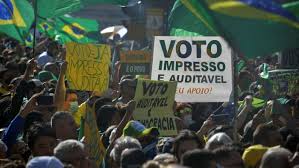The recent elections in Brazil have stirred up a wave of protests across the country, fueled by allegations of voting irregularities and concerns about the integrity of the electoral process. As citizens take to the streets to voice their discontent, the political landscape of Brazil finds itself at a crossroads, with tensions running high and calls for transparency and accountability growing louder. In this article, we delve into the events surrounding the elections, the reasons behind the protests, and the implications for Brazil’s democracy.
Background of the Elections
Overview of the Electoral Process
Brazil, as a democratic republic, holds regular elections to elect its president, members of congress, governors, and local representatives. The electoral process is governed by strict regulations to ensure fairness and transparency.
Controversies Leading Up to the Elections
Leading up to the elections, there were widespread concerns about the influence of misinformation, social media manipulation, and potential interference from external actors in the electoral process.
Allegations of Voting Irregularities
Claims of Voter Suppression
Opposition parties and civil society groups have raised concerns about voter suppression tactics, including the intimidation of voters, tampering with voting machines, and irregularities in the voter registration process.
Discrepancies in Election Results
Reports of discrepancies in election results, including instances of vote manipulation and irregularities in the vote counting process, have further fueled suspicions of electoral fraud.
Protests and Demonstrations
Citizen Outcry Against Electoral Fraud
In response to the allegations of voting irregularities, thousands of Brazilians have taken to the streets to protest, demanding transparency, accountability, and a fair investigation into the alleged electoral fraud.
Calls for Electoral Reform
The protests have also reignited calls for electoral reform to strengthen democratic institutions, enhance electoral transparency, and safeguard the integrity of the electoral process.
Government Response and Controversy
Denial of Allegations by Authorities
Government officials have denied allegations of electoral fraud, dismissing them as unfounded and politically motivated. They have emphasized the importance of respecting the outcome of the elections and upholding the rule of law.
Criticism of Government Handling
Critics have accused the government of downplaying the seriousness of the allegations and failing to address the legitimate concerns raised by protesters, further deepening the political divide in the country.
Implications for Brazil’s Democracy
Threats to Democratic Institutions
The controversy surrounding the elections and the protests that have ensued pose significant challenges to Brazil’s democratic institutions, raising doubts about the credibility and legitimacy of the electoral process.
Need for Accountability and Transparency
The events highlight the urgent need for accountability and transparency in Brazil’s electoral system to restore public trust and confidence in the democratic process.
The elections in Brazil have sparked widespread protests and allegations of voting irregularities, underscoring the challenges facing the country’s democracy. As Brazilians demand transparency and accountability, it is essential for authorities to address the concerns raised and uphold the integrity of the electoral process to ensure the continued stability and legitimacy of Brazil’s democratic institutions.




